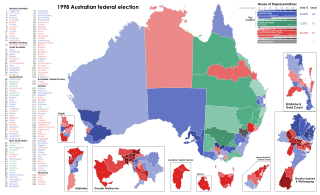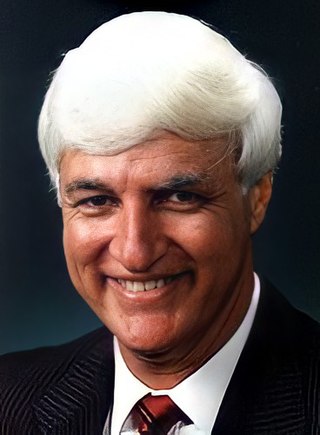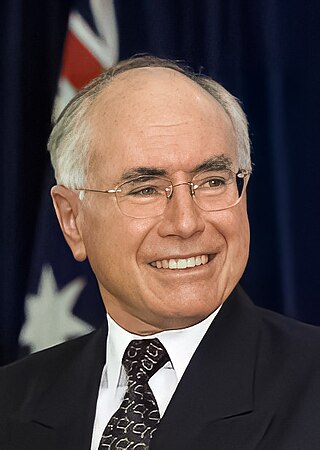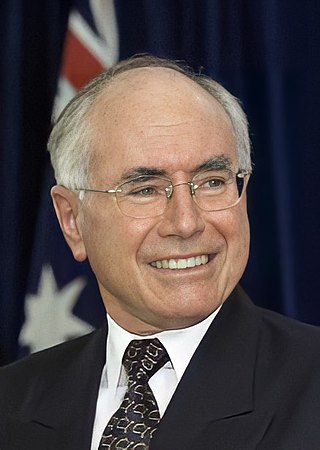Related Research Articles

John Robert Hewson AM is an Australian former politician who served as leader of the Liberal Party from 1990 to 1994. He led the Liberal-National Coalition to defeat at the 1993 Australian federal election.

The 1998 Australian federal election was held to determine the members of the 39th Parliament of Australia. It was held on 3 October 1998. All 148 seats of the House of Representatives and 40 seats of the 76 seat Senate were up for election. The incumbent centre-right Liberal/National Coalition government led by Prime Minister John Howard of the Liberal Party and coalition partner Tim Fischer of the National Party defeated the centre-left Australian Labor Party opposition led by Opposition Leader Kim Beazley,despite losing the nationwide popular and two-party preferred vote. However,the Australian Labor Party gained seats compared to the previous election.

Robert Bellarmine Carl Katter is an Australian politician who has been a member of the House of Representatives since 1993. He was previously active in Queensland state politics from 1974 to 1992. Katter was a member of the National Party until 2001,when he left to sit as an independent. He formed his own party,Katter's Australian Party,in 2011.
Richard William Brian Harradine was an Australian politician who served as an independent member of the Australian Senate,from 1975 to 2005,representing the state of Tasmania. He was the longest-serving independent federal politician in Australian history,and a Father of the Senate.
Marjorie Madeline Henzell is an Australian politician. She was an Australian Labor Party member of the Australian House of Representatives from 1993 to 1996,representing the electorate of Capricornia.
The following lists events that happened during 1998 in Australia.
The following lists events that happened during 1999 in Australia.
The following lists events that happened during 1997 in Australia.
The following lists events that happened during 1996 in Australia.

Rob Justin Hulls is a former Australian politician who was a member of the Victorian Legislative Assembly from 1996 to 2012,representing the electorate of Niddrie. As well as serving as the Deputy Premier of Victoria,he held the posts of state attorney-general and Minister for Racing.

John Winston Howard is an Australian former politician who served as the 25th prime minister of Australia from 1996 to 2007. He held office as leader of the Liberal Party of Australia,his eleven-year tenure as prime minister is the second-longest in Australian history,behind only Sir Robert Menzies. Howard has also been the oldest living Australian former prime minister since the death of Bob Hawke in May 2019.
Mary Louise Easson is an Australian politician. She was an Australian Labor Party member of the Australian House of Representatives from 1993 to 1996,representing the Sydney-based electorate of Lowe.

The 2010 Australian federal election was held on Saturday,21 August 2010 to elect members of the 43rd Parliament of Australia. The incumbent centre-left Australian Labor Party led by Prime Minister Julia Gillard won a second term against the opposition centre-right Liberal Party of Australia led by Opposition Leader Tony Abbott and Coalition partner the National Party of Australia,led by Warren Truss,after Labor formed a minority government with the support of three independent MPs and one Australian Greens MP.
Anthony John Lawler is an Australian politician. He was a National Party of Australia member of the Australian House of Representatives from 1998 to 2001,representing the electorate of Parkes. A pharmacist outside of politics,he retired after one term due to the impact of having to frequently be away from home on his young family.

The Howard government refers to the federal executive government of Australia led by Prime Minister John Howard between 11 March 1996 and 3 December 2007. It was made up of members of the Liberal–National Coalition,which won a majority of seats in the House of Representatives at four successive elections. The Howard government commenced following victory over the Keating government at the 1996 federal election. It concluded with its defeat at the 2007 federal election by the Australian Labor Party,whose leader Kevin Rudd then formed the first Rudd government. It was the second-longest government under a single prime minister,with the longest having been the second Menzies government (1949–1966).

Aidan Patrick McLindon is an Australian politician. He was first elected for the seat of Beaudesert to the Queensland State Parliament for the Liberal National Party at the 2009 state election. He resigned from that party to become an independent in May 2010,and in June 2010 he established The Queensland Party,which he merged with Katter's Australian Party in August 2011. He lost his seat to the LNP at the 2012 election. Bob Katter appointed McLindon as National Director for the newly created Katter's Australian Party. 18 months later McLindon resigned to spend more time with his family. McLindon established an independent political consultancy,AMac Consultants Pty Ltd,following the 2013 federal election.
Katter's Australian Party (KAP) is an agrarian populist political party in Australia that advocates for agrarian socialist economic policies and conservative social policies. It was founded by Bob Katter,an independent and former Nationals MP for the seat of Kennedy,with a registration application lodged to the Australian Electoral Commission in 2011.

Carl Robert Katter is an Australian political activist who was the Labor Party's candidate for the seat of Higgins in the 2016 federal election. Katter is also known for having been involved in the push for LGBT rights during his political career.

The Turnbull government was the federal executive government of Australia led by the 29th prime minister of Australia,Malcolm Turnbull,from 2015 to 2018. It succeeded the Abbott government,which brought the Coalition to power at the 2013 Australian federal election. The government consisted of members of Australia's Liberal-Nationals Coalition. Turnbull took office by challenging his leader,Tony Abbott,in an internal leadership ballot. Warren Truss,the leader of the Nationals,served as deputy prime minister until he retired in 2016 and was replaced by Barnaby Joyce. Joyce resigned in February 2018 and the Nationals' new leader Michael McCormack became deputy prime minister. The Turnbull government concluded with Turnbull's resignation ahead of internal leadership ballot which saw him succeeded as prime minister by Scott Morrison and the Morrison government.

The 2023 New South Wales state election was held on 25 March 2023 to elect the 58th Parliament of New South Wales,including all 93 seats in the Legislative Assembly and 21 of the 42 seats in the Legislative Council. The election was conducted by the New South Wales Electoral Commission (NSWEC).
References
- 1 2 "Biography for MAREK, Paul". Australian Parliamentary Library. Retrieved 12 March 2020.
- ↑ "Nats select panel beater". The Canberra Times . Australian Capital Territory, Australia. 4 June 1995. p. 3. Retrieved 12 March 2020– via Trove.
- ↑ "Racism row distracts Liberals". The Age. 28 February 1996. Retrieved 12 March 2020.
- ↑ "Air crash: Sharp demands answers". Sydney Morning Herald. 7 November 1996. Retrieved 12 March 2020.
- ↑ "'Urgent' inquiry on safety of airline". Sydney Morning Herald. 8 November 1996. Retrieved 12 March 2020.
- ↑ "Hanslide absolves Nats doomsayers". The Australian. 17 June 1998.
- ↑ "Renegade MPs show Wik is fair: PM". The Age. 30 October 1997. Retrieved 12 March 2020.
- ↑ "Blow to Coalition as renegades cross floor over Wik". Sydney Morning Herald. 30 October 1997. Retrieved 12 March 2020.
- ↑ "Wik Bill Passes House To Face Hostile Senate". The Canberra Times. 30 October 1997.
- ↑ "The House reveals its ugliest faces". Sydney Morning Herald. 26 November 1997. Retrieved 12 March 2020.
- ↑ "Wraps come off the race debate". Sydney Morning Herald. 29 November 1997. Retrieved 12 March 2020.
- ↑ "Sunset clause beyond the pale, says Harradine". Sydney Morning Herald. 2 December 1997. Retrieved 12 March 2020.
- ↑ "The great dividing range". Sydney Morning Herald. 6 December 1997. Retrieved 12 March 2020.
- ↑ "Racing towards an election". Sydney Morning Herald. 11 April 1998. Retrieved 12 March 2020.
- ↑ "Nationals seek changes in policy". The Age. 16 June 1998. Retrieved 12 March 2020.
- ↑ "They came, they saw and they loved it". Sydney Morning Herald. 13 August 1998. Retrieved 12 March 2020.
- ↑ "Howard's glowing picture of reform". The Age. 16 August 1998. Retrieved 12 March 2020.
- ↑ "GST doubts nag Nationals MPs". The Age. 24 September 1998. Retrieved 12 March 2020.
- ↑ "Now Nats fight GST on food". Sydney Morning Herald. 23 September 1998. Retrieved 12 March 2020.
- ↑ "GST jitters / Government MPs warn John Howard". Daily Telegraph. 14 June 1998.
- ↑ "Coalition Telstra split deepens". The Age. 29 September 1998. Retrieved 12 March 2020.
- ↑ "Nationals pledge to fight complete Telstra sell-off". Sydney Morning Herald. 29 September 1998. Retrieved 12 March 2020.
- ↑ "Nationals split over One Nation preferences". The Age. 12 September 1998. Retrieved 12 March 2020.
- ↑ "The Brand new chance for Kim". Sydney Morning Herald. 13 September 1998. Retrieved 12 March 2020.
- ↑ "Back on track". Sydney Morning Herald. 28 September 1998. Retrieved 12 March 2020.
- ↑ "Result of the poll of the century". The Age. 4 October 1998. Retrieved 12 March 2020.
- ↑ "Fischer praises NP result". The Age. 4 October 1998. Retrieved 12 March 2020.
- ↑ "Time to rally to the flag Republican model faulty and risky says opponent". Townsville Bulletin. 6 November 1999.